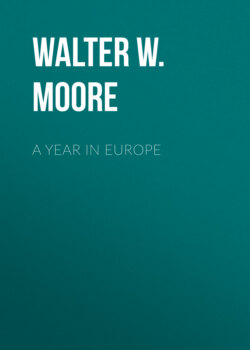Читать книгу A Year in Europe - Walter W. Moore - Страница 7
На сайте Литреса книга снята с продажи.
ОглавлениеThe Unification of the World.
Various nationalities were represented in our ship's company, the Anglo-Saxon predominating. This reminds me of the fact that the ocean has played no small part in the unification of the world as thus far accomplished. Nothing, perhaps, distinguishes the modern world more sharply from the ancient than its views of the ocean. To the ancients the sea was a mystery and a terror; it was a barrier, it separated men. To the moderns the sea is a highway, a means of communication, it unites men. The nearest approach to a unification of the race in ancient times was effected by the law of the Roman and the language of the Greek. The unifying force to-day is the Anglo-Saxon, who to the genius of the Roman for conquest and government, and to the genius of the Greek for letters and art, has added the genius of the Phœnician for commerce and the genius of the Hebrew for religion. Here we touch the secret of his ascendancy. The Anglo-Saxon civilization is Christian. His language is becoming the universal language. His institutions are becoming the universal institutions. His ships carry the passengers and produce of the world. His capital dominates commerce. London is the clearing-house of the world. Will this unification continue? Will it endure? It will if the religion to which the Anglo-Saxon owes his preëminence remains preëminent in his civilization. The brotherhood of man—how else shall it ever be fully and permanently brought about, except through men's knowledge of the Fatherhood of God? And how can the Fatherhood of God ever be known except through him who taught us to say, "Our Father," and of whom the Father said, "This is my beloved Son in whom I am well pleased. Hear ye him?" It is no accident that the nations which have most reverently heeded this divine command, the nations which are most truly Christian, are the nations which have hitherto stood in the forefront of the foremost civilizations of mankind, and are the nations which now hold the future.
"Jesus shall reign where'er the sun
Does his successive journeys run,
His kingdom stretch from shore to shore
Till moons shall wax and wane no more."
The force which will bind all men in a real and permanent union is no mere knowledge of navigation, nor is it Anglo-Saxon commerce, laws, or language; it is the Christian religion.
All's Well That Ends Well.
The latter part of our voyage was less trying than the earlier, and the days were generally brighter, though still cold. Yet all were glad when one night, about nine o'clock, the intermittent gleam of the lighthouse on the Scilly Islands came into view, assuring us that the voyage would soon be ended. Next morning we were steaming along the picturesque south coast of England, with the white chalk cliffs and velvety green downs in plain view through the tender blue haze, the water was quieter and the weather warmer, and in a few hours more we entered The Solent, passing on our right, almost within a stone's throw, "The Needles," three white, pointed rocks of chalk, at the western extremity of the Isle of Wight, which rest on dark colored bases and spring abruptly from the sea to a height of a hundred feet, and which are in striking contrast with the vertically striped cliffs of red, yellow, green, and grey sandstone behind them.
At last the great engines cease their throbbing for the first time in nine days, the tender comes alongside for the passengers bound for Great Britain, and in another half hour we set foot on the soil of England, in the ancient city of Southampton.
